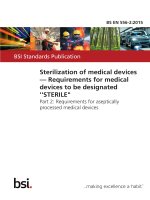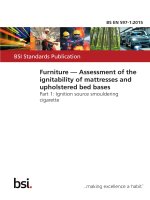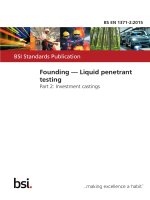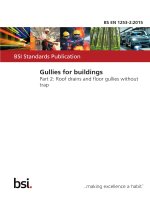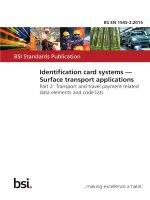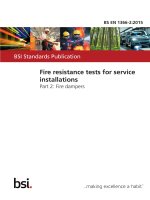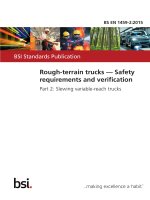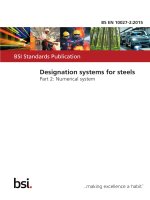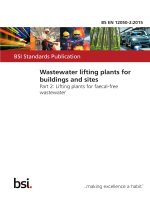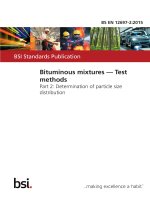Bsi bs en 00597 2 2015
Bạn đang xem bản rút gọn của tài liệu. Xem và tải ngay bản đầy đủ của tài liệu tại đây (997.97 KB, 16 trang )
BS EN 597-2:2015
BSI Standards Publication
Furniture — Assessment of the
ignitability of mattresses and
upholstered bed bases
Part 2: Ignition source: match flame
equivalent
BS EN 597-2:2015
BRITISH STANDARD
National foreword
This British Standard is the UK implementation of EN 597-2:2015. It
supersedes BS EN 597-2:1995 which is withdrawn.
The UK participation in its preparation was entrusted to Technical
Committee FW/6, Flammability performance and fire tests for
furniture.
A list of organizations represented on this committee can be
obtained on request to its secretary.
This publication does not purport to include all the necessary
provisions of a contract. Users are responsible for its correct
application.
© The British Standards Institution 2016.
Published by BSI Standards Limited 2016
ISBN 978 0 580 85288 6
ICS 13.220.40; 97.140
Compliance with a British Standard cannot confer immunity from
legal obligations.
This British Standard was published under the authority of the
Standards Policy and Strategy Committee on 31 January 2016.
Amendments/corrigenda issued since publication
Date
Text affected
BS EN 597-2:2015
EN 597-2
EUROPEAN STANDARD
NORME EUROPÉENNE
EUROPÄISCHE NORM
December 2015
ICS 13.220.40; 97.140
Supersedes EN 597-2:1994
English Version
Furniture - Assessment of the ignitability of mattresses
and upholstered bed bases - Part 2: Ignition source: match
flame equivalent
Ameublement - Évaluation de l'allumabilité des
matelas et des sommiers rembourrés - Partie 2: Source
d'allumage : flamme équivalente à celle d'une allumette
Möbel - Bewertung der Entzündbarkeit von Matratzen
und gepolsterten Bettböden - Teil 2: Zündquelle: eine
einem brennenden Streichholz vergleichbare
Gasflamme
This European Standard was approved by CEN on 7 November 2015.
CEN members are bound to comply with the CEN/CENELEC Internal Regulations which stipulate the conditions for giving this
European Standard the status of a national standard without any alteration. Up-to-date lists and bibliographical references
concerning such national standards may be obtained on application to the CEN-CENELEC Management Centre or to any CEN
member.
This European Standard exists in three official versions (English, French, German). A version in any other language made by
translation under the responsibility of a CEN member into its own language and notified to the CEN-CENELEC Management
Centre has the same status as the official versions.
CEN members are the national standards bodies of Austria, Belgium, Bulgaria, Croatia, Cyprus, Czech Republic, Denmark, Estonia,
Finland, Former Yugoslav Republic of Macedonia, France, Germany, Greece, Hungary, Iceland, Ireland, Italy, Latvia, Lithuania,
Luxembourg, Malta, Netherlands, Norway, Poland, Portugal, Romania, Slovakia, Slovenia, Spain, Sweden, Switzerland, Turkey and
United Kingdom.
EUROPEAN COMMITTEE FOR STANDARDIZATION
COMITÉ EUROPÉEN DE NORMALISATION
EUROPÄISCHES KOMITEE FÜR NORMUNG
CEN-CENELEC Management Centre: Avenue Marnix 17, B-1000 Brussels
© 2015 CEN
All rights of exploitation in any form and by any means reserved
worldwide for CEN national Members.
Ref. No. EN 597-2:2015 E
BS EN 597-2:2015
EN 597-2:2015 (E)
Contents
Page
European foreword....................................................................................................................................................... 3
Introduction .................................................................................................................................................................... 4
1
Scope .................................................................................................................................................................... 5
2
Terms and definitions ................................................................................................................................... 5
3
3.1
3.2
Criteria of ignition........................................................................................................................................... 6
Progressive smouldering ignition............................................................................................................. 6
Flaming ignition............................................................................................................................................... 6
4
Principle ............................................................................................................................................................. 6
5
5.1
5.2
5.3
Health and safety of operators ................................................................................................................... 6
General ................................................................................................................................................................ 6
Enclosure............................................................................................................................................................ 6
Extinguishers .................................................................................................................................................... 7
6
6.1
6.2
6.3
6.4
6.5
Apparatus........................................................................................................................................................... 7
Test rig ................................................................................................................................................................ 7
Test enclosure .................................................................................................................................................. 8
Clock..................................................................................................................................................................... 8
Ignition source: gas flame ignition source, match-flame equivalent ........................................... 8
Gas flow control ............................................................................................................................................... 8
7
7.1
7.2
Atmospheres for conditioning and testing ............................................................................................ 9
Conditioning...................................................................................................................................................... 9
Atmosphere for testing ................................................................................................................................. 9
8
8.1
8.2
8.3
Test assembly ................................................................................................................................................... 9
General ................................................................................................................................................................ 9
Small scale ......................................................................................................................................................... 9
Full size ............................................................................................................................................................... 9
9
9.1
9.2
9.3
Test procedure ................................................................................................................................................. 9
Preparation ....................................................................................................................................................... 9
Ignition source application....................................................................................................................... 10
Final examination ........................................................................................................................................ 10
10
Test report ...................................................................................................................................................... 10
Annex A (informative) Model test report form................................................................................................. 12
2
BS EN 597-2:2015
EN 597-2:2015 (E)
European foreword
This document (EN 597-2:2015) has been prepared by Technical Committee CEN/TC 207 “Furniture”,
the secretariat of which is held by UNI.
This European Standard shall be given the status of a national standard, either by publication of an
identical text or by endorsement, at the latest by June 2016 and conflicting national standards shall be
withdrawn at the latest by June 2016.
Attention is drawn to the possibility that some of the elements of this document may be the subject of
patent rights. CEN [and/or CENELEC] shall not be held responsible for identifying any or all such patent
rights.
This document supersedes EN 597-2:1994.
The test is based on EN 1021-2, Furniture – Assessment of the ignitability of upholstered furniture – Part
2: Ignition source: match flame equivalent.
The main changes in relation to EN 597-2:1994 are:
— the standard has been aligned with EN 597-1;
— a tolerance has been added to the temperature of the gas flame;
— clarification of the gas supply required to produce ignition source 1.
According to the CEN-CENELEC Internal Regulations, the national standards organizations of the
following countries are bound to implement this European Standard: Austria, Belgium, Bulgaria,
Croatia, Cyprus, Czech Republic, Denmark, Estonia, Finland, Former Yugoslav Republic of Macedonia,
France, Germany, Greece, Hungary, Iceland, Ireland, Italy, Latvia, Lithuania, Luxembourg, Malta,
Netherlands, Norway, Poland, Portugal, Romania, Slovakia, Slovenia, Spain, Sweden, Switzerland,
Turkey and the United Kingdom.
3
BS EN 597-2:2015
EN 597-2:2015 (E)
Introduction
This European Standard is one of a series of standards concerned with the ignitability of upholstered
furniture using various ignition sources. The ignition source used in this European Standard is a gas
flame equivalent to a match flame.
When mattresses or bed bases are used or stored on their own, it is desirable to know their ignitability
in their own right.
It cannot be assumed that protection against flaming sources will automatically give protection against
smouldering ignition. Users of the standard should therefore recognize the need to submit test
specimens to both a gas flame equivalent to a match flame and cigarette ignition tests.
WARNING — Attention is drawn to the fact that the tests given in the test report (see Clause 10)
are not intended to reproduce the full fire hazards that may be encountered.
4
BS EN 597-2:2015
EN 597-2:2015 (E)
1 Scope
This European Standard specifies a test method to assess the ignitability of mattresses, upholstered bed
bases, when subjected to a gas flame as an ignition source.
Air mattresses and water beds are excluded from this standard.
The standard contains one annex:
Annex A (informative) Model test report form.
2 Terms and definitions
For the purposes of this document, the following terms and definitions apply.
2.1
progressive smouldering
exothermic oxidation, not accompanied by flaming, that is self-propagating, i.e. independent of the
ignition source, which may or may not be accompanied by incandescence
2.2
flaming
undergoing combustion in the gaseous phase with the emission of light
2.3
flammability
ability of a material or product to burn with a flame under the specified test conditions
2.4
ignitability
measure of the ease with which a material, product or component can be ignited so as to flame or
progressively smoulder
2.5
ignition source
source of energy used to ignite combustible materials or products
2.6
mattress pad
upholstered product that is used in conjunction with, and to complement, a mattress or upholstered bed
base
2.7
mattress
upholstered product intended for sleeping upon
2.8
bed base
structure of a bed that supports a mattress or the surface(s) of a mattress that support(s) a user
2.9
upper surface
surface of a bed base that supports a mattress or the surface(s) of a mattress that support(s) a user
5
BS EN 597-2:2015
EN 597-2:2015 (E)
3 Criteria of ignition
3.1 Progressive smouldering ignition
For the purposes of this European Standard, all the following types of behaviour are considered to be
progressive smouldering ignitions:
a) any test assembly that displays escalating combustion behaviour so that it is unsafe to continue the
test and active extinction is necessary;
b) any test assembly that smoulders until it is largely consumed within the test duration;
c) any test assembly that smoulders to its full thickness, within the duration of the test;
d) any test assembly that smoulders after one hour from the application of the ignition source;
e) any test assembly that, on final examination (see 9.3), shows evidence of progressive smouldering.
NOTE
In practice it has been found that there is usually a clear distinction between materials which can char
under the influence of the ignition source but which do not propagate further (non-progressive combustion) and
those where smouldering develops in extent and spreads (progressive combustion).
3.2 Flaming ignition
For the purposes of this European Standard, all the following types of behaviour are considered to be
flaming ignitions:
a) any test assembly that displays escalating combustion behaviour so that it is unsafe to continue the
test and active extinction is necessary;
b) any test assembly that burns until it is essentially consumed within the test duration;
c) any test assembly on which any flame front reaches the lower margin, either side or passes through
its full thickness within the duration of the test;
d) any flaming which continues for more than 120 s after removal of the burner tube.
4 Principle
To subject a full upper surface or upper surface characteristic features of a mattress, the bed base or the
mattress pad to the contact of a gas flame which is equivalent to a match flame by placing the gas flame
so that all the zones having different characteristics are tested.
5 Health and safety of operators
5.1 General
The test method specified in this European Standard presents a considerable hazard; suitable
precautions shall be taken.
5.2 Enclosure
For safety, the test should be conducted in a non-combustible fume cupboard. If such a cupboard is not
available, a test enclosure should be constructed (see 6.2) so that the operator is protected from the
fumes.
6
BS EN 597-2:2015
EN 597-2:2015 (E)
5.3 Extinguishers
Adequate means of extinguishing the assembly should be provided, bearing in mind that some
combinations may produce severe flaming during the test. A hand and/or fixed water spray which can
be directed over the burning area can be useful. Other means such as suitable fire extinguishers, fire
blankets and a bucket of water will assist.
In some cases, smouldering may be difficult to extinguish completely and complete immersion in water
may be necessary.
6 Apparatus
6.1 Test rig
Consisting of a platform of expanded steel or open mesh at least 450 mm x 450 mm supported at least
75 mm above a solid base (a suitable test rig mesh is illustrated in Figure 1). The size of the mesh is not
critical.
For the tests the rigs shall be sited within the enclosure (see 6.2) and the testing shall be performed in a
basically draught-free environment permitting an adequate supply of air and removal of smoke from
the area of the apparatus.
Dimensions in millimetres
Key
A mesh made from wire approximately 2 mm in diameter
X test rig width at least test specimen width
Y test rig length at least test specimen length
Figure 1 — Test rig assembly
7
BS EN 597-2:2015
EN 597-2:2015 (E)
6.2 Test enclosure
The test enclosure shall consist of either a room with a volume greater than 20 m3 (which contains
adequate oxygen for testing) or a smaller enclosure with a through flow of air. Inlet and extraction
systems providing an air speed rate of less than 0,2 m/s in the locality of the rig provide adequate
oxygen without disturbing the burning behaviour.
6.3 Clock
The clock shall be capable of measuring to at least 1 h with an accuracy of 1 s.
6.4 Ignition source: gas flame ignition source, match-flame equivalent
NOTE 1
This source has been designed to give a calorific output approximating to that of a burning match.
A burner tube consisting of a length of stainless steel tube [(8 ± 0,1) mm outside diameter,
(6,5 ± 0,1) mm internal diameter and (200 ± 5) mm in length] is connected by flexible tubing to a
cylinder containing butane via a flowmeter, fine control valve, on-off valve (optional) and cylinder
regulator providing outlet pressure of nominal 2,8 kPa 1).
NOTE 2
Where tubing of these dimensions is not readily available, stainless steel tubing of approximately
similar dimensions can be used provided that the 50 mm length at the ‘flame’ end of the tube is machined to the
given size. To facilitate positioning the tube, a suitable handle can be fitted to it at least 100 mm from the flame
end of the burner tube.
A calibrated flow meter shall supply butane gas at a flow rate of (45 ± 2) ml/min at (25 ± 3) °C. The
flexible tubing connecting the output of the flowmeter to the burner tube shall be 2,5 m to 3 m in length
with an internal diameter of (7 ± 1) mm.
NOTE 3
This corresponds to a flame height of approximately 35 mm.
6.5 Gas flow control
It is essential that the rate of supply of gas to the burner tube conforms to the flow rate specified. Some
difficulties have been reported with the supply and measurement of the gas, particularly where the gas
cylinder has, of necessity, to be stored in an environment cooler than the defined test conditions and/or
at some distance from the test rig.
In these cases, and other situations where difficulties occur, it is important that there should be
sufficient length of tubing inside the controlled environment (10 °C to 30 °C) to ensure that the gas
equilibrates to the required temperature (before flow measurement). One way to assist this is to pass
the gas (before flow measurement) through a metal tube immersed in water maintained at a constant
temperature such that the gas temperature at entry to the flow meter is (25 ± 3) °C, so that flow
corrections for temperature variations can be avoided.
Great care also needs to be exercised with the measurement and setting of the flow rate of the gas.
Direct reading flowmeters, even those obtained with a direct gas calibration, need to be checked when
initially installed and also at regular intervals during testing by a method capable of accurately
measuring the absolute gas flow at the burner tube. One way of doing this is to connect the burner tube
with a short length of tubing (about 7 mm inside diameter) to a soap bubble flowmeter, such that the
upward passage of a soap film meniscus in a glass tube of calibrated volume (e.g. a burette) over a
known period of time gives an absolute measurement of the flow.
1)
8
3
2
1kPa = 10 N/m = 10 mbar
BS EN 597-2:2015
EN 597-2:2015 (E)
7 Atmospheres for conditioning and testing
7.1 Conditioning
The materials to be tested and the cigarettes shall be conditioned for at least 24 h immediately before
the tests in the following atmosphere:
— temperature:
(23 ± 2) °C;
— relative humidity: (50 ± 5) %.
7.2 Atmosphere for testing
The test shall be carried out in an atmosphere having a temperature between 10 °C and 30 °C and a
relative humidity between 15 % and 80 %.
8 Test assembly
8.1 General
The test assembly materials shall be representative of the components and make-up of the finished
mattress, mattress pad or upholstered bed base.
8.2 Small scale
For small scale tests, the test specimen shall be rectangular in shape and have a minimum size of
450 mm x 450 mm x nominal thickness of the finished mattress, mattress pad or upholstered bed base.
The type of proposed edge finishing system shall be incorporated, e.g. plain, piped or taped edge.
Representative tension shall be maintained in the cover. The proposed mattress, mattress pad or
upholstered bed base finish shall be represented in the specimen, e.g. tufted or quilted.
NOTE
Representative tension can be maintained in the cover by means of suitable clips if the section is
produced by cutting.
8.3 Full size
For full size tests 1;1, the actual product shall form the test specimen.
9 Test procedure
9.1 Preparation
NOTE
The application of the ignition source can be within 20 min of removing the test materials from the
conditioning atmosphere (7.1). If there is a significant distance between the conditioning room and the room
where testing is carried out, the materials can be protected against de-conditioning during transfer between
rooms. If possible, the assembly can be prepared inside the conditioning room.
9.1.1
9.1.2
Ensure that means of extinguishing are close to hand (see 5.3).
For a small scale test place the test specimen in the test rig (see 6.1).
For full size tests:
— Bed bases are tested on a horizontal surface (feet of the bed bases may have to be fitted if they exist
on the actual product;
9
BS EN 597-2:2015
EN 597-2:2015 (E)
— Mattresses or mattress pads are tested on a horizontal surface.
9.2 Ignition source application
9.2.1 Light the gas emerging from the burner tube, adjust the gas flow to the specified rate (see 6.4)
and allow the flame to stabilize for at least 2 min.
9.2.2 Within 20 min of removing the materials from the conditioning room, position the burner tube
in position on a flat portion of the upper surface of the test specimen so that the burner tube is not less
than 100 mm from the nearest edge or marks left by any previous tests, and simultaneously start the
clock. Where the test specimen has a piped or taped-edge finish, or is quilted or tufted, apply the burner
tube to additional positions on the taped edge, in the grove of the quilt-line and on the tufts.
The burner tube shall be horizontal and in contact with the test specimen.
9.2.3 Allow the gas to burn for a period of (15 ± 1) s, then terminate the ignition process by carefully
removing the burner tube from the test piece.
9.2.4 Observe the progress of combustion, and record any evidence of progressive smouldering or
flaming in the interior and/or cover. Disregard any flames or smouldering that cease within 120 s of the
removal of the burner tube.
9.2.5 If progressive smouldering ignition (see 3.1 a), b), c) d)) or flaming ignition (see 3.2) of the test
specimen is observed, extinguish the test specimen and record this. In these circumstances discontinue
testing and complete the test report (see Clause 10).
9.2.6 If progressive smouldering ignition or flaming ignition of the test specimen is not observed,
repeat the test at a fresh position as described in 9.2.2.
9.2.7 If progressive smouldering ignition (see 3.1 a), b), c) d)) or flaming ignition (see 3.2) of the test
specimen is observed in this repeat test, extinguish the test assembly and record this. Discontinue
testing and complete the test report (see Clause 10).
9.2.8 If progressive smouldering ignition or flaming ignition is not observed in the repeat test, record
this and carry out the final examination (see 9.3).
9.2.9
If the two surfaces of the test specimen are different in any way, both sides shall be tested.
9.3 Final examination
Cases of progressive smouldering ignition undetected from the outside have been reported.
Immediately after completion of the test programme, dismantle the test specimen and examine it
internally for progressive smouldering ignition. If this is found, extinguish the test specimen and record
a failed result and complete the test report (see Clause 10). For safety reasons, ensure that all
smouldering has ceased before the rig is left unattended.
If no internal progressive smouldering ignition is found, record non-ignition and complete the test
report (see Clause 10).
10 Test report
The test report, of which the form shown in Annex A is an example, shall give the following information:
a) reference to this European Standard, i.e. EN 597-2;
10
BS EN 597-2:2015
EN 597-2:2015 (E)
b) description of the mattress, mattress pad or upholstered bed base and any other components, and if
necessary, the identification of the tested surface;
c) whether ignition or non-ignition occurred in each test. If ignition occurred with at least one of the
flame applications, the overall result is taken as ignition;
d) if ignition occurred, whether it was progressive smouldering ignition or flaming ignition, and the
measurements or observations relevant to the criteria for ignition.
The report shall also include the words “The above test results relate only to the ignitability of the
combination of materials under the particular conditions of test; they are not intended as a means of
assessing the full potential fire hazard of the mattress, mattress pad or upholstered bed base in use.”
11
BS EN 597-2:2015
EN 597-2:2015 (E)
Annex A
(informative)
Model test report form
Issuing authority ................................................................................................................................. Test No. .................................................
Sample ....................................................................................................................... Date .................. Company ................................................
Test report in accordance with EN 597-2 (confidential)
Assessment of ignitability: Ignition source: match flame equivalent
Materials tested ............................................................................................................................................................................................ ……
Surface tested ................................................................................................................................................................................................ …….
Test results: (non-ignition, smouldering ignition, flaming ignition):………………………………………………….
Smouldering criteria
Match
flame
equivalent
1
Smouldering criteria
*
Unsafe escalating combustion (3.1 a)
Comments (including position of
flame)
2
*
Test assembly consumed (3.1 b)
Smoulders through thickness (3.1 c)
Smoulders more than 1 h (3.1 d)
In the final examination, presence
progressive smouldering (3.1 e)
Flaming criteria
of
Unsafe escalating combustion (3.2 a)
Test assembly consumed (3.2 b)
Burning through thickness (3.2 c)
Flames longer than 120 s (3.2 d)
*Enter ‘YES’ if criteria exceeded or ‘NO’ if criteria not
exceeded
Signed: ............................................................................................................................................................................................................................
(Any extraordinary events should be reported overleaf)
The above test results relate only to the ignitability of the combination of materials under the particular
conditions of test; they are not intended as a means of assessing the full potential fire hazard of the
materials in use.
12
This page deliberately left blank
NO COPYING WITHOUT BSI PERMISSION EXCEPT AS PERMITTED BY COPYRIGHT LAW
British Standards Institution (BSI)
BSI is the national body responsible for preparing British Standards and other
standards-related publications, information and services.
BSI is incorporated by Royal Charter. British Standards and other standardization
products are published by BSI Standards Limited.
About us
Revisions
We bring together business, industry, government, consumers, innovators
and others to shape their combined experience and expertise into standards
-based solutions.
Our British Standards and other publications are updated by amendment or revision.
The knowledge embodied in our standards has been carefully assembled in
a dependable format and refined through our open consultation process.
Organizations of all sizes and across all sectors choose standards to help
them achieve their goals.
Information on standards
We can provide you with the knowledge that your organization needs
to succeed. Find out more about British Standards by visiting our website at
bsigroup.com/standards or contacting our Customer Services team or
Knowledge Centre.
Buying standards
You can buy and download PDF versions of BSI publications, including British
and adopted European and international standards, through our website at
bsigroup.com/shop, where hard copies can also be purchased.
If you need international and foreign standards from other Standards Development
Organizations, hard copies can be ordered from our Customer Services team.
Subscriptions
Our range of subscription services are designed to make using standards
easier for you. For further information on our subscription products go to
bsigroup.com/subscriptions.
With British Standards Online (BSOL) you’ll have instant access to over 55,000
British and adopted European and international standards from your desktop.
It’s available 24/7 and is refreshed daily so you’ll always be up to date.
You can keep in touch with standards developments and receive substantial
discounts on the purchase price of standards, both in single copy and subscription
format, by becoming a BSI Subscribing Member.
PLUS is an updating service exclusive to BSI Subscribing Members. You will
automatically receive the latest hard copy of your standards when they’re
revised or replaced.
To find out more about becoming a BSI Subscribing Member and the benefits
of membership, please visit bsigroup.com/shop.
With a Multi-User Network Licence (MUNL) you are able to host standards
publications on your intranet. Licences can cover as few or as many users as you
wish. With updates supplied as soon as they’re available, you can be sure your
documentation is current. For further information, email
BSI Group Headquarters
389 Chiswick High Road London W4 4AL UK
We continually improve the quality of our products and services to benefit your
business. If you find an inaccuracy or ambiguity within a British Standard or other
BSI publication please inform the Knowledge Centre.
Copyright
All the data, software and documentation set out in all British Standards and
other BSI publications are the property of and copyrighted by BSI, or some person
or entity that owns copyright in the information used (such as the international
standardization bodies) and has formally licensed such information to BSI for
commercial publication and use. Except as permitted under the Copyright, Designs
and Patents Act 1988 no extract may be reproduced, stored in a retrieval system
or transmitted in any form or by any means – electronic, photocopying, recording
or otherwise – without prior written permission from BSI. Details and advice can
be obtained from the Copyright & Licensing Department.
Useful Contacts:
Customer Services
Tel: +44 845 086 9001
Email (orders):
Email (enquiries):
Subscriptions
Tel: +44 845 086 9001
Email:
Knowledge Centre
Tel: +44 20 8996 7004
Email:
Copyright & Licensing
Tel: +44 20 8996 7070
Email:
